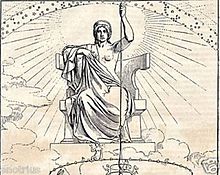Ananke
In ancient Greek religion, Ananke (/əˈnæŋkiː/; Greek: Ἀνάγκη, from the common noun ἀνάγκη, "force, constraint, necessity") is the personification of inevitability, compulsion and necessity. She is customarily depicted as holding a spindle. One of the Greek primordial deities, the births of Ananke and her brother and consort, Chronos (the personification of Time, not to be confused with the Titan Cronus) were thought to mark the division between the eon of Chaos and the beginning of the cosmos. Ananke is considered the most powerful dictator of fate and circumstance; mortals as well as gods respected her power and paid her homage. Sometimes considered the mother of the Fates, she is thought to be the only being to influence their decisions[1] (according to some sources, excepting Zeus also). According to Schowalter and Friesen, she and the Fates "are all sufficiently tied to early Greek mythology to make their Greek origins likely."[2]
The ancient Greek traveller Pausanias wrote of a temple in ancient Corinth where the goddesses Ananke and Bia (meaning force, violence or violent haste) were worshiped together in the same shrine. Ananke is also frequently identified or associated with Aphrodite, especially Aphrodite Ourania, the representation of abstract celestial love; the two were considered to be related, as relatively unanthropomorphised powers that dictated the course of life.[3][4][5] Her Roman counterpart is Necessitas ("necessity").[6]




No comments:
Post a Comment